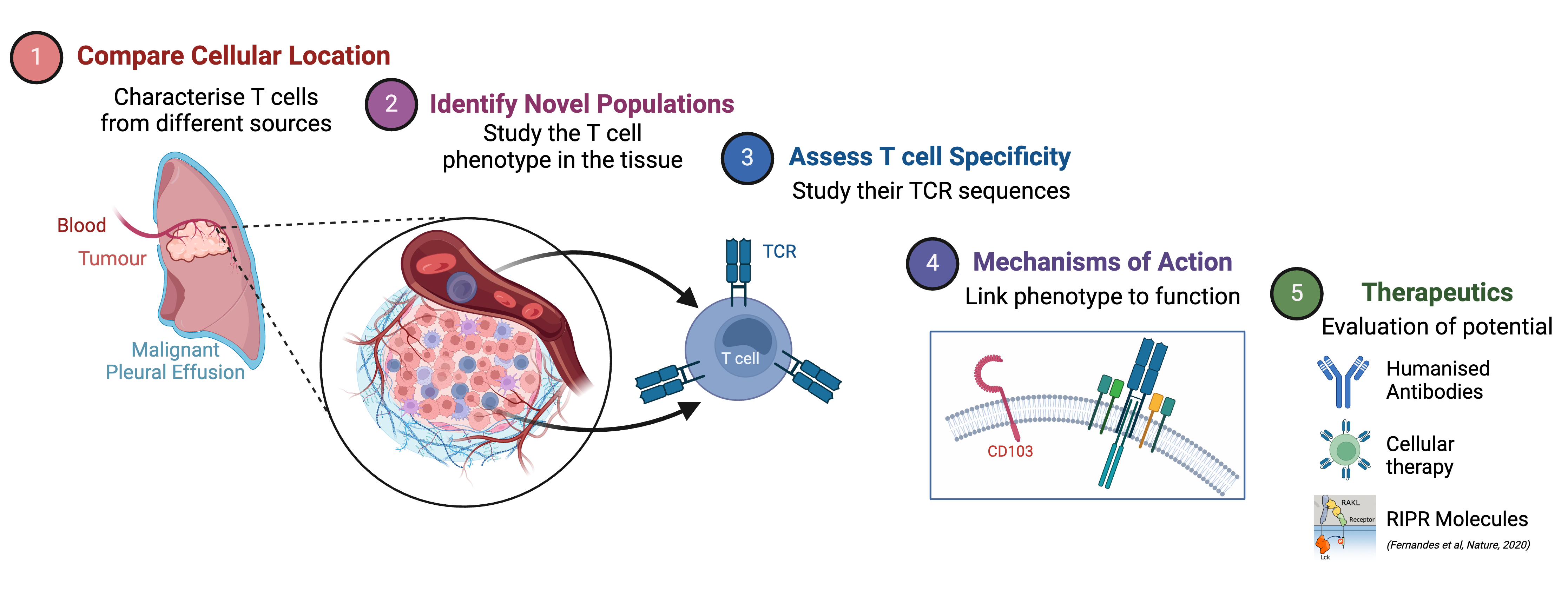Founded in 2010
Our group focuses on determining the factors which affect T cells both in the control of viral infection and in the development of cancer.

Overview
Human infections, cancer development and the course of disease are mainly influenced by T cell responses. While a robust and appropriate T cell response is beneficial to the host, a weak or inappropriate response can be ineffective or even have a detrimental effect. Numerous factors influence the quality of the T cell response to viral infections or cancer development. Predominant among them being the microenvironment of the tumour or infection site, the type of cells affected and in the case of infection, the variability of the virus.
The aim of our research is to investigate the functional aspects of antigen specific cytotoxic T cells (CTL) with a focus on the factors affecting CTL in controlling virus infection and cancer progression. Over the past two decades, we have been working to understand the key factors required for efficient viral control by T cells in a number of different viral infections and cancer. Establishing both ex-vivo and in-vitro T cell functional evaluation platforms for antigen-specific T cells isolated from tissue and blood. By linking functional data with multi-omic single cell and T cell receptor (TCR) repertoire analysis, we continue to identify potential targets and pathways to augment and control the immune response as a way of improving the outcome of several important human diseases including SARS-CoV-2 virus infection and cancer.
Spotlight Series video
We recently filmed a video for the MRC Translational Immune Discover Unit (TIDU) at the MRC Weatherall Institute of Molecular Medicine. Our group is split across the MRC TIDU and the CAMS Oxford Institute.
Understanding the role of T cells in cancer

Our group are working to characterise and understand the T cell repertoire present in multiple sites that are influenced by cancer. By comparing T cells from different locations we can identify location-specific differences and potentially identify novel populations of T cells that are specific to a particular cancer. Once these T cells have been identified, we can assess their specificity by looking at their T cell receptor (TCR) sequences. Finally, we can investigate mechanisms of action and link phenotypic data to function, potentially opening avenues for therapeutic intervention in the future.
Understanding the role of T cells in emerging viral infections

For many years, our lab has been able to identify and characterise virus-specific T cells. During the pandemic we were able to streamline this process and create a pipeline for analysis of virus-specific T cells throughout the course of infection. Starting with identification of viral antigens through peptide screens, we can then identify key responses or factors that are associated with disease; establishing those that are protective from those that are pathogenic. With our platform we are able to evaluate how the long-term memory response is altered over time, as well as following re-infection or exposure to vaccines. Finally, we can rapidly assess how viral variants affect T cell responses. Altogether this allows us to get a good understanding of T cell responses in emerging viral infections and provides key research for future vaccines.
Funding
Chinese Academy of Medical Sciences Oxford Institute
Janssen Pharmaceutical Innovation Fund
John Fell Fund
PAST LAB MEMBERS
Maria Veretennikova (Senior Bioinformatician)
Guihai Liu (Postdoc, D.Phil 2022)
Delaney C C Dominey-Foy (D.Phil 2025)
Megat Abd Hamid (Postdoc, D.Phil 2019)
Zixi Yin (Postdoc, D.Phil 2022)
Wenbo Wang (D.Phil 2022)
Henry Laurenson-Schafer (D.Phil 2018)
Xi Li (D.Phil 2018)
Chi Zhang (D.Phil 2017)
Sophie Andrews (D.Phil 2017)
Linghang Wang (D.Phil 2014)
Mohammed Rai (D.Phil 2014)
Julie Glanvile (D.Phil 2013)
Eirini Moysi (D.Phil 2012)
Abigail Cumshaw (D.Phil 2011)
Srinica Ranasinghe (D.Phil 2011)
Yonghong Zhang (D.Phil 2009)
Laurel Lee (D.Phil 2009)
Hathajrat Thananchai (D.Phil 2008)
Alex Leligdowicz (D.Phil 2008)
Tumelo Mashishi (D.Phil 2007)
Ed Moran (D.Phil 2007)
Kerry Kite (RA)
Shaza Mohamed (RA)
Claudia Gonzalez-Lopez (RA)
Ushani Rajapaksa (Postdoc)
Shokouh Makvandi-Nejad (Postdoc)
Lili Wang (Postdoc)
Tim Powell (Postdoc)
Reto Schumacher (Postdoc)
















